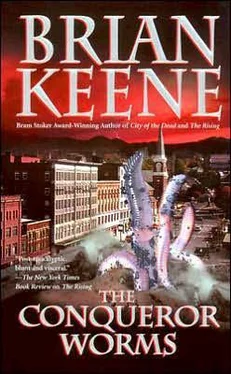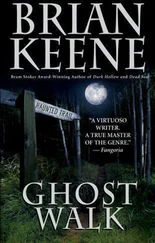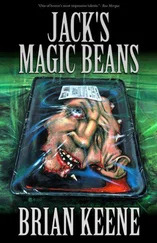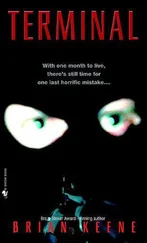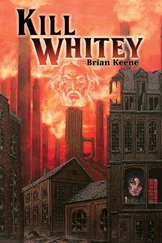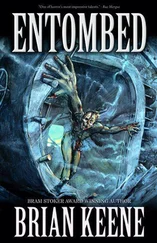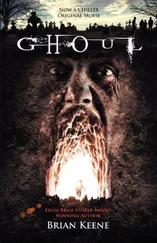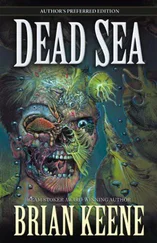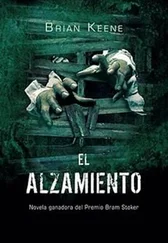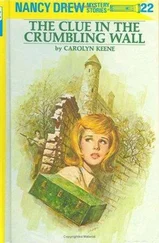Maybe it sounds cliché, but my heart was in my throat for most of the drive. In the years before the rain, when winter came to visit and the snow piled high, Rose and I didn’t go to Renick. For people our age, the winding one-lane road was treacherous even in the best conditions. But after thirty days of rain, it was a nightmare, worse than the harshest West Virginia blizzard.
One side of the mountain road used to be nothing but cornfields and pastures. The other side was a steep drop down a forested mountainside, with only a steel guardrail as a buffer. Now, the rain had flooded the fields and pastures, washing away not only the crops and grass but the topsoil as well. Streams of brown water gushed down the mountain and huge gray rocks jutted up from the mud like uncovered dinosaur bones. Uprooted trees lay scattered across the road, and I had to drive on the sides to get around them. The biggest, an old oak, completely blocked my way.
I spotted the tree as I rounded the corner. I slammed on the brakes, and the truck fishtailed, sliding towards the guardrail. Shouting, I gripped the wheel and did what Rose would have done—chastised myself for being a stubborn, stupid, bullheaded old man. The truck spun. The front bumper slammed into the tree, and the rear crumpled the guardrail. I closed my eyes, holding my breath and waiting for the truck to topple over the side. My heart pounded, and I felt a stab of pain in my chest. This was a stupid way to die, and I expected Rose would be waiting on the other side, shaking her head the way she used to when she thought I was doing something foolish. But I didn’t crash through the guardrail and roll down the mountainside. Instead, the truck stalled out on me. I opened my eyes to find myself looking back in the direction I came.
I clutched my chest, trying to get my breathing under control. My pills were back at the house. If I had a heart attack out here, nobody would be around to help me. I imagined I could hear Rose scolding me from on high.
“I know,” I said out loud. “You told me so, dear. I’m just being foolish.”
Eventually, the pains in my chest disappeared. I got out of the truck to check on the damage, praying I didn’t have a flat tire. The damage wasn’t bad; just some dents and scraped paint. If I’d been going any faster, it would have been a lot worse. I was pretty sure the truck would start again, and was actually glad it didn’t have airbags, since a deployed one would have made it impossible to drive back home. I was a realist. At my age, there was no way I’d be able to walk back up the mountain in the rain. I’d be dead before I made it two miles.
Death. At my age, I was used to the idea. It was imminent. Some mornings, I’d wake up and be surprised I was still here. But when I thought back on my life, I wondered what it was all about. Was it worth it, all the joys and heartaches? What was the point of it all, if it only led to this—an old man drowning alone in a flooded world?
Standing there in the downpour, I heard a flock of geese passing somewhere overhead. I craned my neck skyward, but I couldn’t see them. They were lost behind the permanent white haze that covered the earth. The fog bank started just above the treetops and continued into the heavens, blocking out the moon and stars. The disembodied honking sounded eerie and made me feel lonelier than ever. I wondered where they were going, and wished them luck on their journey.
Satisfied that the truck was still operational, I surveyed my surroundings. A few scraggly trees were still standing here and there on the slope, and I looked down on Renick through a break in the tops of them. Or maybe I should say I looked down at where Renick used to be, because the town was gone.
The Greenbrier River had swallowed up the entire valley. There was an ocean in the place where Renick had once been.
Renick had stood at the base of the mountain, nestled in the valley. Beyond it was the state road to Lewisburg (that was a real road, with two lanes and a yellow dividing line down the middle). If you traveled from Renick and back the way I’d come, you would have headed up the mountain, passing a few shacks and houses, each one complete with the regulation, rusted-out car propped up on cinder blocks, and a brand new satellite dish on the roof. West Virginia had one of the highest welfare populations in the nation, but everybody had a satellite dish.
You would have then entered Punkin’ Center, which consisted of nothing more than seven houses, the combination post office and feed store (run by my good friend Carl Seaton), and then several farms. Keep on going and you’d pass a few hunting cabins, Dave and Nancy Simmons’ place, crazy Earl Harper’s shanty, the lane that went back to my place, and then miles of West Virginia state forestland. At that point, the road narrowed to a dirt track leading up to Bald Knob. It ended at the lookout tower the rangers used to watch for forest fires in the summer, and their station underneath it.
All of this was deserted and washed out when I made my trek down the mountain. The National Guard had cleared everybody out of Punkin’ Center a few weeks before. I stayed behind, though, even when they insisted that I leave. Oh, I guess they could have made me leave if they’d tried hard enough. It isn’t too hard to force an old man out of his home. But they didn’t. Maybe it was something in my eyes or the tone of my voice, but those young troops backed down quick. This is where I’ve lived for the last thirty years and I wasn’t leaving on account of the weather.
I looked back down on Renick. The town was attainable from our side of the mountain only by means of a steel and concrete bridge that spanned the Greenbrier. On one side of the bridge was the road on which I was stranded. The town lay on the other side. That morning, on Day Thirty, the bridge was gone.
It wasn’t just destroyed, mind you. The bridge was gone. It had vanished along with the rest of the world, leaving our mountain standing in the midst of a new ocean. That’s what it looked like. Either the Greenbrier had gotten very big, or the Atlantic Ocean had gotten very lost and decided to come inland for a spell. Everything was submerged—all the homes and businesses and the school. Everything except for the Presbyterian Church steeple and old Fred Laudermilk’s grain silo, jutting up from the water like lone mountaintops.
That was when the full impact of what had happened hit me. There’d be no State Fair down in Lewisburg this year and no cornbread and bean suppers at the American Legion. The rickety yellow school bus wouldn’t be making its trip up the mountain to pick up the few kids in Punkin’ Center and old Fred Laudermilk wouldn’t be bringing in the hay this fall. Ditto for Daniel Ortel’s wacky weed crop (we all knew he grew it, but nobody said anything) and Clive Clendenon’s corn. My crazy neighbor, Earl Harper, wouldn’t have to concern himself anymore about the government conspiracy of the week, and I wouldn’t have to worry about poachers on my land this coming deer season.
They always said this would happen because of a hole in the ozone layer. They said that greenhouse gases would melt the polar ice caps, flooding the world. But that’s not what happened at all.
One day, a day like any other day, it just started raining and didn’t stop. It’s as simple as that. We certainly didn’t expect it. It was a rainy day, but tomorrow would bring sunshine again. But tomorrow never came. The next day, it was still raining. And the day after that. Every day brought the same forecast; rain, no matter where you lived. Except that there aren’t really days anymore—just differing shades of gray and black. I haven’t seen the sun or the moon for a long time. They’ve been reduced to silhouettes, hiding behind the clouds like muted silver dollars.
Читать дальше
